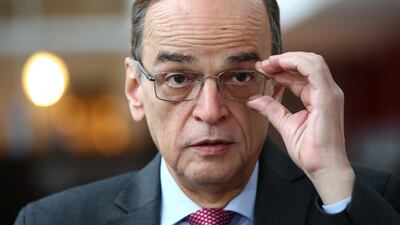It is Syrians' duty to find a way to live together, the co-chair of the 150-member committee meeting to draft a new constitution for the war-torn country has told The National.
Hadi Al Bahra, former head of the Syrian opposition coalition, was speaking before the start of a first round of talks in Geneva on Wednesday.
The meetings will involve members of the regime and the opposition sitting in the same room for the first time since the war began in 2011.
“This will show our resolve and insistence on reaching a fair political solution to the crisis through the complete implementation of UN Security Council Resolution 2254,” Mr Al Bahra said.
The UN resolution calls for a new Syrian constitution, UN-supervised elections as well as transparent and accountable governance.
Mr Al Bahra said that finding a way to end a war in which hundreds of thousands of people died and that displaced about half of Syria's prewar population of 22 million is "a duty to our country".
"We are all Syrian and, as Syrians, we have to live together," he said.
The launch of Syria’s Constitutional Committee, a UN-led peace-building initiative, took two years and involved precarious negotiations between four countries – Russia, Iran, Turkey and the Syrian government.
Mr Al Bahra said the body would not have come about had it not been for the backing of international players who have interests in the country.
“We have to be honest. We know that the Constitutional Committee has been on the table for two years, but it moved nowhere until it had enough support from the international community – that’s what made it active,” he said.
The committee has the job of writing a postwar constitution that will structure the future of the shattered country.
UN officials say the committee is vital to creating political reforms and elections that will hopefully unify Syria and end the civil war.
"Reaching international and regional consensus is now a condition of achieving a political solution [to end the war] but it will be the Syrian people who will sit at the table to write the constitution," Mr Al Bahra said.
A congress convened by Russia – a leading ally of President Bashar Al Assad – last year gave the UN envoy for Syria the task of forming a committee to draft a new constitution, after many rounds of talks to end the war failed.
On Tuesday, the foreign ministers of Russia, Iran and Turkey held talks with officials in Geneva. However, the ministers will not directly participate in the Syrian-led committee.
“Based on our own intentions, we come with positive spirits and we want to produce something that our people deserve,” Mr Al Bahra said.
Convening the Constitutional Committee – the first tangible progress since the fourth UN envoy to Syria, Geir Pedersen, who took office in January – is regarded as vital to paving the way for change.
“When we discuss the issue of a constitution, we have to be serious about all articles; the most important is the separation of power,” Mr Al Bahra said.
The executive, legislative and judicial branches of government, he said, must be completely separate from the other in order for them to each be equally represented.
“The mission of the committee will be to review Syria’s constitutional history from 1920 and onwards,” Mr Al Bahra said.
The opposition is demanding the committee draws up a new document that will “guarantee the dignity of citizens as well as preserving and protecting the freedom of the public”.
What Syria needs is a new social, economic and legal contract that reshapes and reorganises the life of Syrians, Mr Al Bahra said, adding that “this would guarantee equality, justice and freedom, and will open a new page in our history".

